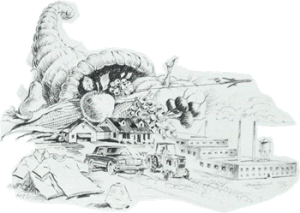
The Economic Dimension Of Liberty Protected By The Constitution
"Agriculture, manufactures, commerce, and navigation, the four pillars of our prosperity, are the most thriving when left most free to individual enterprise."
- Thomas Jefferson
"The enviable condition of the people of the United States is often too much ascribed to the physical advantages of their soil & climate .... But a just estimate of the happiness of our country will never overlook what belongs to the fertile activity of a free people and the benign influence of a responsible government."
- James Madison
America's Constitution did not mention freedom of enterprise per se, but it did set up a system of laws to secure individual liberty and freedom of choice in keeping with Creator-endowed natural rights. Out of these, free enterprise flourished naturally. Even though the words "free enterprise' are not in the Constitution, the concept was uppermost in the minds of the Founders, typified by the remarks of Jefferson and Madison as quoted above.
Already, in 1787, Americans were enjoying the rewards of individual enterprise and free markets. Their dedication was to securing that freedom for posterity. The learned men drafting America's Constitution understood history - mankind's struggle against poverty and government oppression. And they had studied the ideas of the great thinkers and philosophers.
They were familiar with the near starvation of the early Jamestown settlers under a communal production and distribution system and Governor Bradford's diary account of how all benefited after agreement that each family could do as it wished with the fruits of its own labors.
Later, in 1776, Adam Smith's INQUIRY INTO THE NATURE AND CAUSES OF THE WEALTH OF NATIONS and Say's POLITICAL ECONOMY had come at just the right time and were perfectly compatible with the Founders' own passion for individual liberty. Jefferson said these were the best books to be had for forming governments based on principles of freedom.
They saw a free market economy as the natural result of their ideal of liberty. They feared concentrations of power and the coercion that planners can use in planning other peoples lives; and they valued freedom of choice and acceptance of responsibility of the consequences of such choice as being the very essence of liberty. They envisioned a large and prosperous republic of free people, unhampered by government interference. The Founders believed the American people, possessors of deeply rooted character and values, could prosper if left free to:
- acquire and own property
- have access to free markets
- produce what they wanted
|
- work for whom and at what they wanted
- travel and live where they would choose
- acquire goods and services which they desired
|
Such a free market economy was, to them, the natural result of liberty, carried out in the economic dimension of life. Their philosophy tended to enlarge individual freedom - not to restrict or diminish the individual's right to make choices and to succeed or fail based on those choices. The economic role of their Constitutional government was simply to secure rights and encourage commerce. Through the Constitution, they granted their government some very limited powers to:
- assure that the ground rules were fair (a fixed standard of weights and measures)
- encourage initiative and inventiveness (copyright and patent protection laws)
- provide a system of sound currency with an established value (gold and silver coin)
- enforce free trade (free from interfering special interests)
- protect individuals from the harmful acts of others
Adam Smith called it "the system of natural liberty." James Madison referred to it as "the
benign influence of a responsible government." Others have called it the free enterprise system. By whatever name it is called, the economic system envisioned by the Founders and encouraged by the Constitution allowed individual enterprise to flourish and triggered the greatest explosion of economic progress in all of history. Americans became the first people truly to realize the economic dimension of liberty.
Footnote: Our Ageless Constitution, W. David Stedman & La Vaughn G. Lewis, Editors (Asheboro, NC, W. David Stedman Associates, 1987) Part III: ISBN 0-937047-01-5

